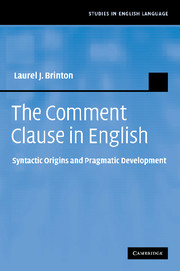Book contents
- Frontmatter
- Contents
- List of figures
- List of tables
- Acknowledgments
- List of abbreviations
- 1 Introduction: comment clauses, parentheticals, and pragmatic markers
- 2 Semantic and syntactic development of pragmatic markers
- 3 Processes of change
- 4 Comment clauses with say
- 5 I mean
- 6 Comment clauses with see
- 7 If you will and as it were
- 8 Comment clauses with look
- 9 What's more and what else
- 10 Epistemic/evidential parentheticals – I gather and I find
- 11 Concluding remarks
- References
- Author index
- Subject index
3 - Processes of change
Published online by Cambridge University Press: 12 July 2009
- Frontmatter
- Contents
- List of figures
- List of tables
- Acknowledgments
- List of abbreviations
- 1 Introduction: comment clauses, parentheticals, and pragmatic markers
- 2 Semantic and syntactic development of pragmatic markers
- 3 Processes of change
- 4 Comment clauses with say
- 5 I mean
- 6 Comment clauses with see
- 7 If you will and as it were
- 8 Comment clauses with look
- 9 What's more and what else
- 10 Epistemic/evidential parentheticals – I gather and I find
- 11 Concluding remarks
- References
- Author index
- Subject index
Summary
Introduction
Most diachronic studies of pragmatic markers in English have been carried out in the framework of grammaticalization studies (e.g., Traugott 1982; Brinton 1996; Traugott 1995a). It is appropriate to reassess whether grammaticalization (see §3.2) is indeed the process that underlies the development of pragmatic markers, especially in light of the fact that, on an empirical level, pragmatic markers are often deemed “agrammatical,” and on a theoretical level, grammaticalization as a distinct process has been questioned. Some alternative processes suggested as underlying the development of pragmatic markers include a process unique to historical pragmatics, “pragmaticalization” (see §3.3), or more general processes of diachronic change, such as “idiomatization” (see §3.5), “subjectification” (see §3.6), and “lexicalization” (see §3.4) – a process which in other contexts is seen as being a “mirror image” of grammaticalization (e.g., Ramat 1992).
Grammaticalization
Definition of grammaticalization
Grammaticalization, a process of linguistic change involving morphosyntactic and semantic changes, has been the subject of intense study and debate for over twenty years (e.g., Heine et al. 1991; Hopper 1991; Hopper and Traugott 1993; 2003; Bybee et al. 1994; Lehmann 1995 [1982]; Haspelmath 1999; Heine 2003; Roberts and Roussou 2003; Brinton and Traugott 2005; for arguments against grammaticalization see Newmeyer 1998; Campbell 2001 and articles therein). It is not the purpose of this book to enter fully into the debate or to provide a new definition of grammaticalization.
- Type
- Chapter
- Information
- The Comment Clause in EnglishSyntactic Origins and Pragmatic Development, pp. 49 - 72Publisher: Cambridge University PressPrint publication year: 2008



